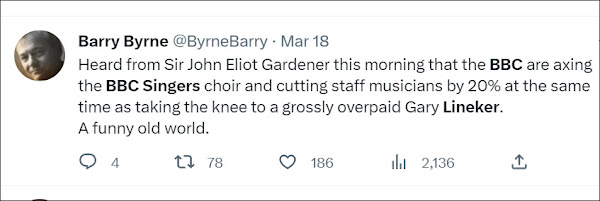Classical music has a salary envy problem
Godwin's rule of Hitler analogies states that once Hitler is mentioned that discussion is ended, because the level of discourse has deteriorated so far further communication is pointless. Which means that whoever mentioned Hitler has lost the argument. I now propose a new rule based on Godwin's law: namely that once Gary Lineker is mentioned in a discussion about the BBC Singers, whoever mentioned Gary Lineker has lost the argument.
First a disclaimer. I am not a football fan and I believe disbanding the BBC Singers is a mistake. But I also live in the real world and see that classical music is doing an appalingly bad job at defending the BBC Singers. BBC TV's Match of the Day fronted by Gary Lineker has a weekly audience of around 2.5 million viewers, and Lineker's on-screen presence guarantees a massive license fee loyalty that helps fund the BBC's classical music activities. I deliberately use words 'help fund' as neither Lineker's salary nor the cost of the BBC Singers is funded entirely by the license fee. In 2021/22 the licence fee accounted for 71% of BBC funding. The remaining 29% came from commercial and other activities such as grants, royalties and rental income.
The obsessive disparaging of Gary Lineker is a manifestation of a much bigger problem in classical music that has been around for some time. Classical music has a serious salary and audience envy problem. This means that any activity attracting a bigger audience than classical music is decried as valueless entertainment, while any celebrity earning a big salary is lampooned by juvenile pictures on the classical industry's mouthpiece Slipped Disc.
Yet, even worse, this audience and salary envy is schizophrenic. Any activity attracting a bigger audience is decried, yet the one thing classical music wants is a bigger audience. Similarly, celebrities attracting big money are lampooned, yet classical music wants bigger and bigger money for its celebrity conductors and designer concert halls.
Let's not forget that Riccardo Muti's salary at the Chicago Symphony Orchestra for the 2018/19 season was £2.8 million before guest conducting and other income. Muti's salary is more than double Gary Lineker's and almost twice the amount needed to save the BBC Singers. And then there is the classical concert hall of choice, the Elbphilharmonie, which cost 600 Gary's (£780 million). While Slipped Disc, which is leading the charge against Gary Lineker, speculated that if Mirga Gražinytė-Tyla wanted to move to the New York Philharmonic "salary negotiations will start at $2 million. She could hold out for $3m – if she wants it".
I have not seen a single proposal in the voluminous protests as to how classical music's increasing appetite for money can be reconciled with falling demand and the resulting industry overcapacity. The BBC Singers are the wrong target for cost savings. But if the classical industry really wants to ensure the BBC Singers' future it really needs to up its game. It needs to stop banging on about Gary Lineker, it needs to drop its 'holier than thou' attitude, it needs to face up to the core problems of falling demand and overcapacity, and it needs to project a much more balanced and mature image.










Comments